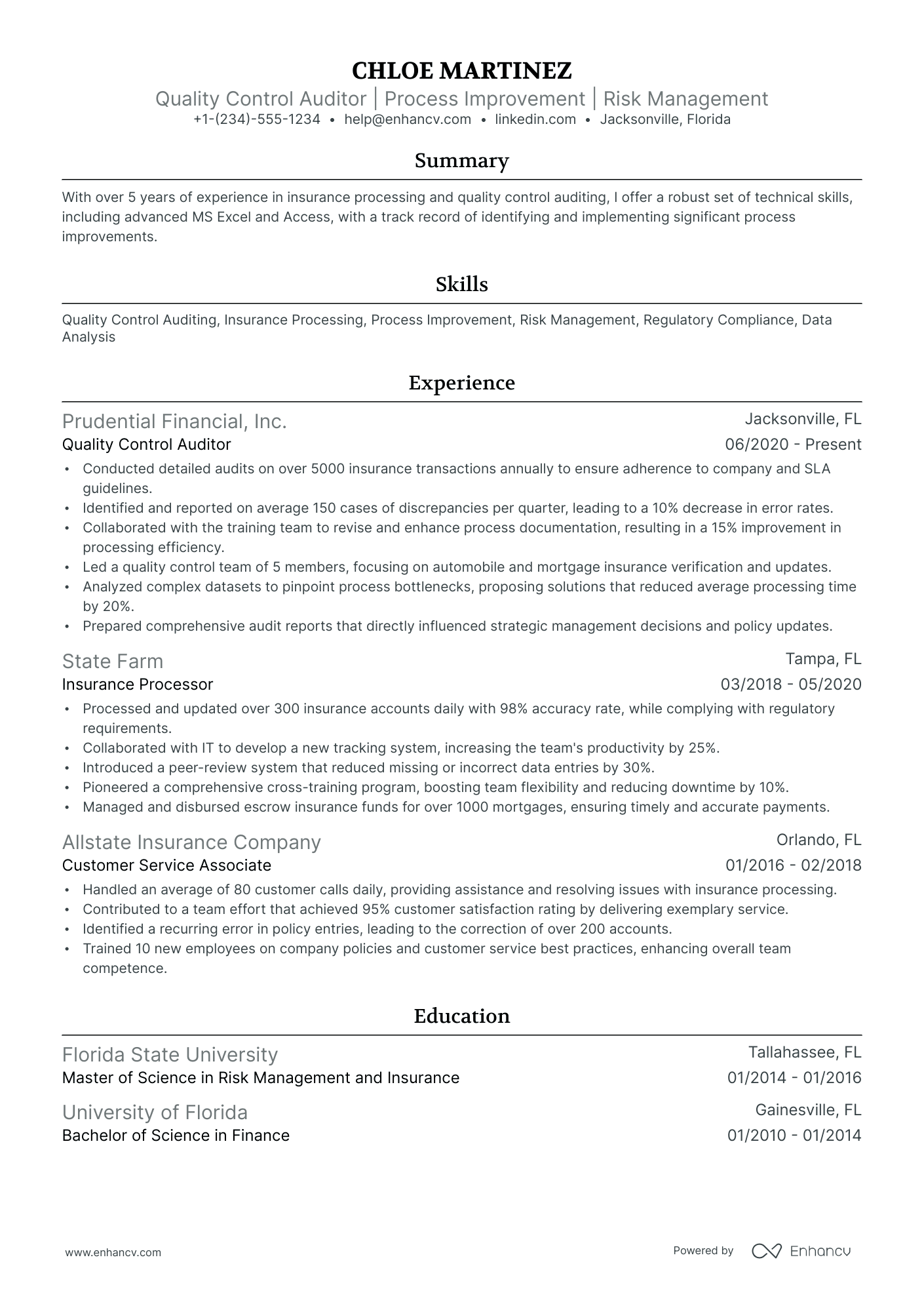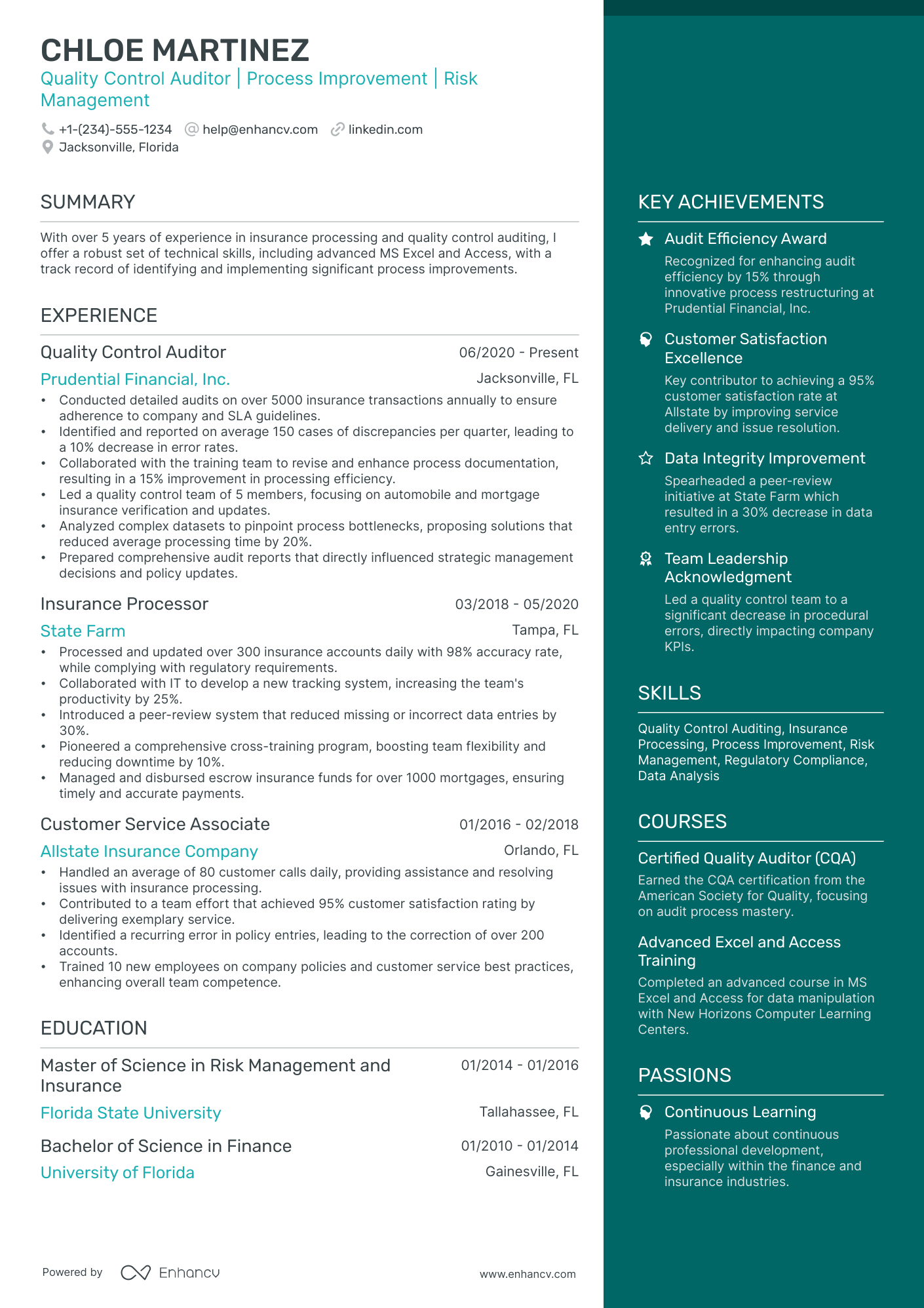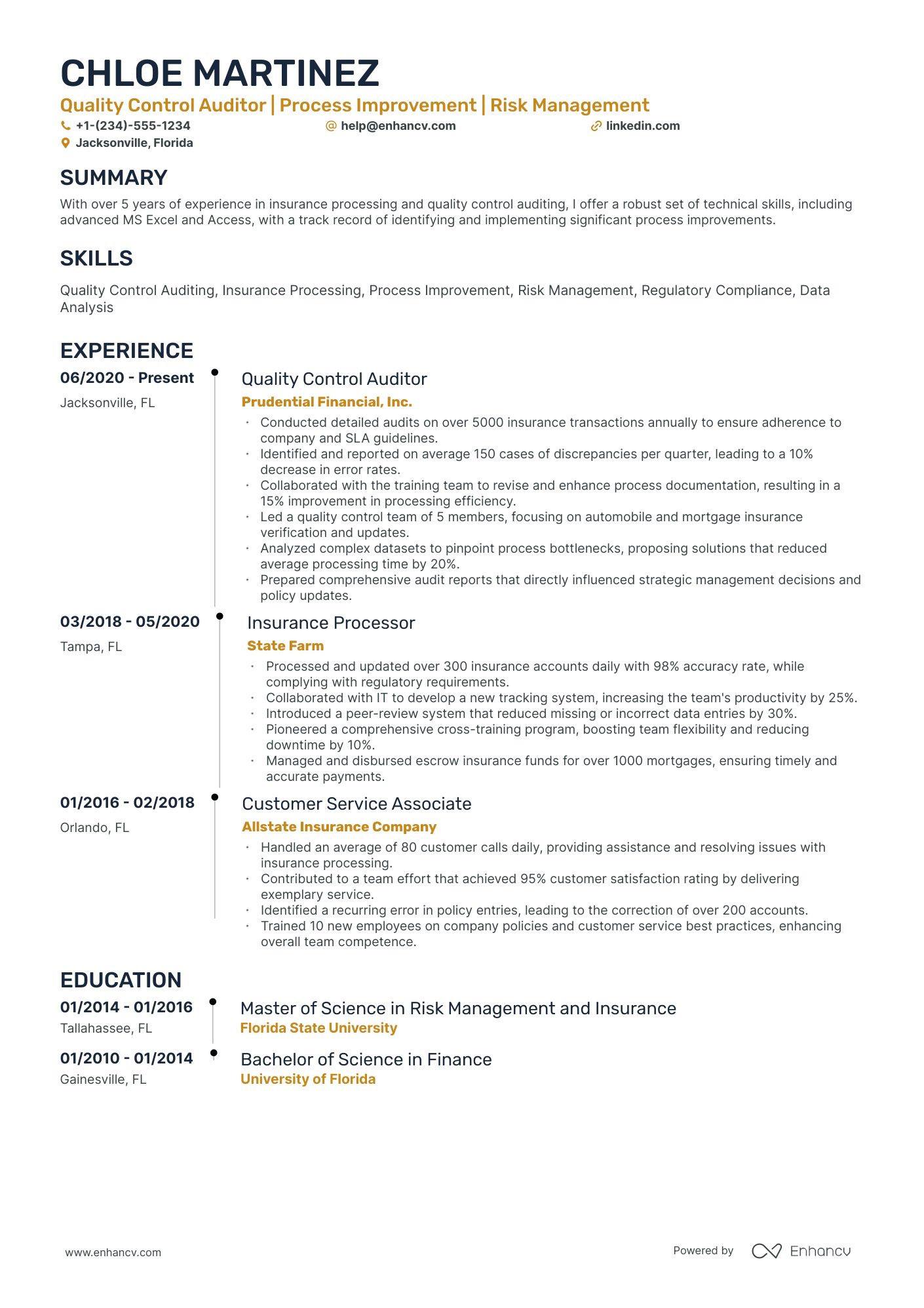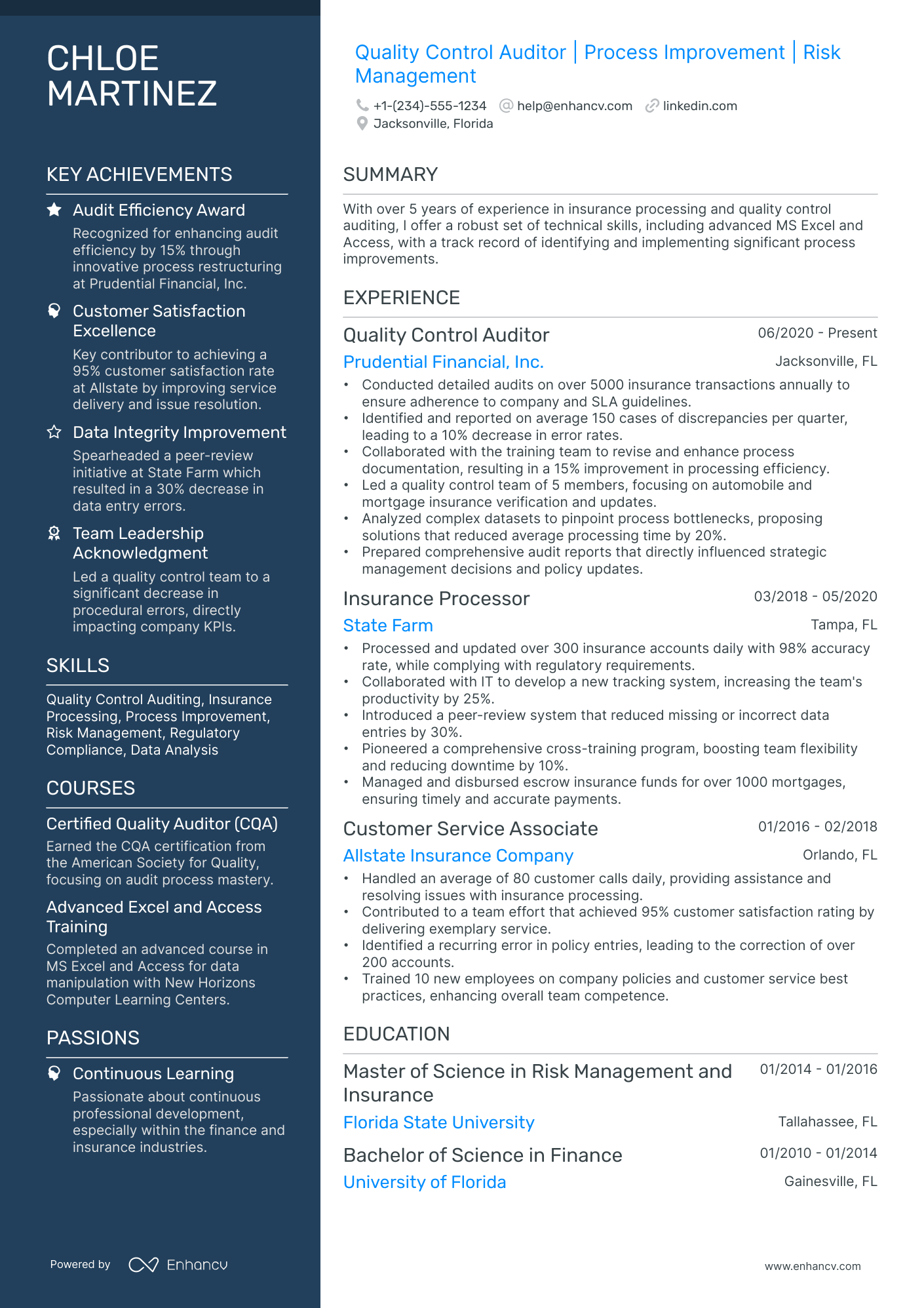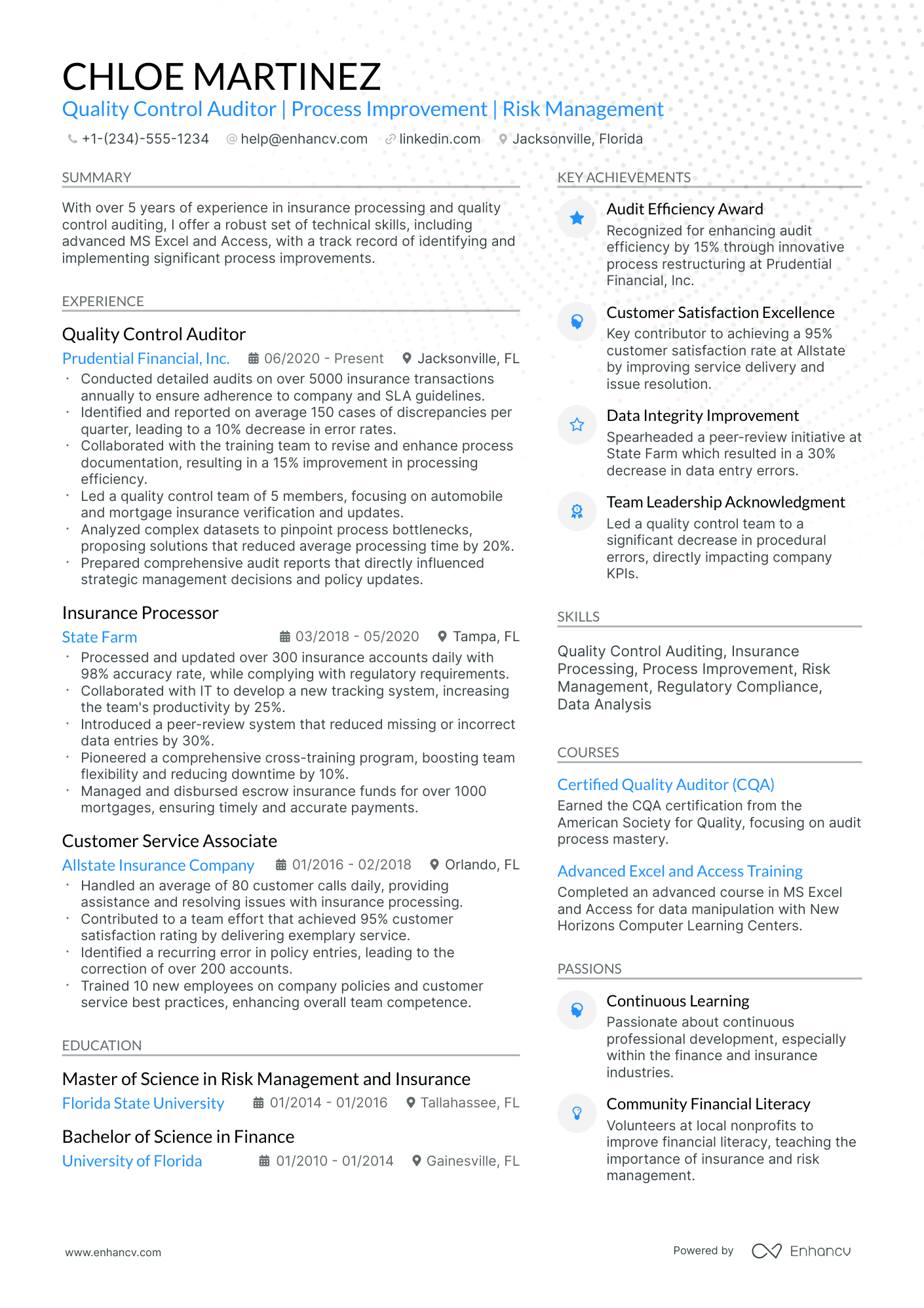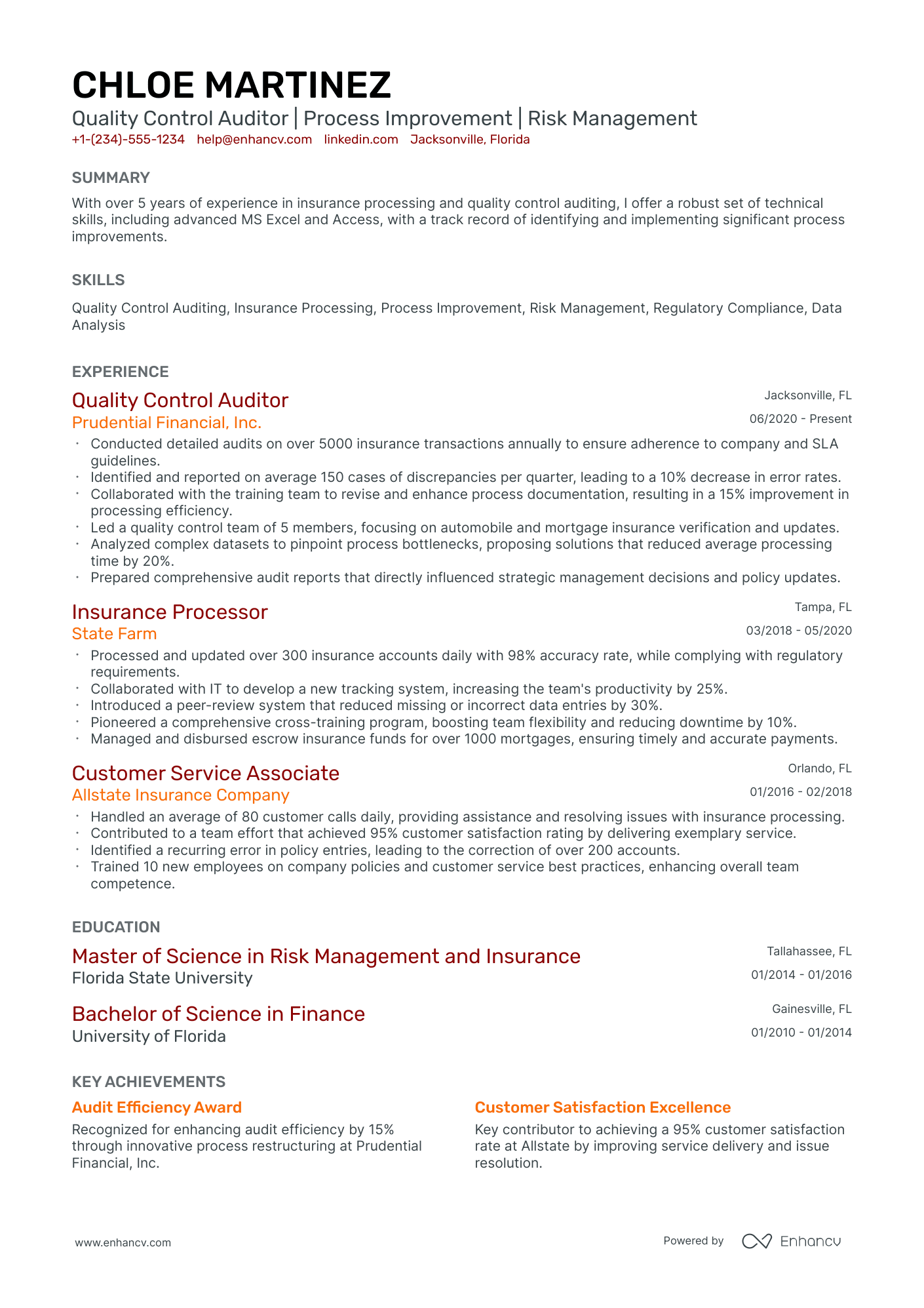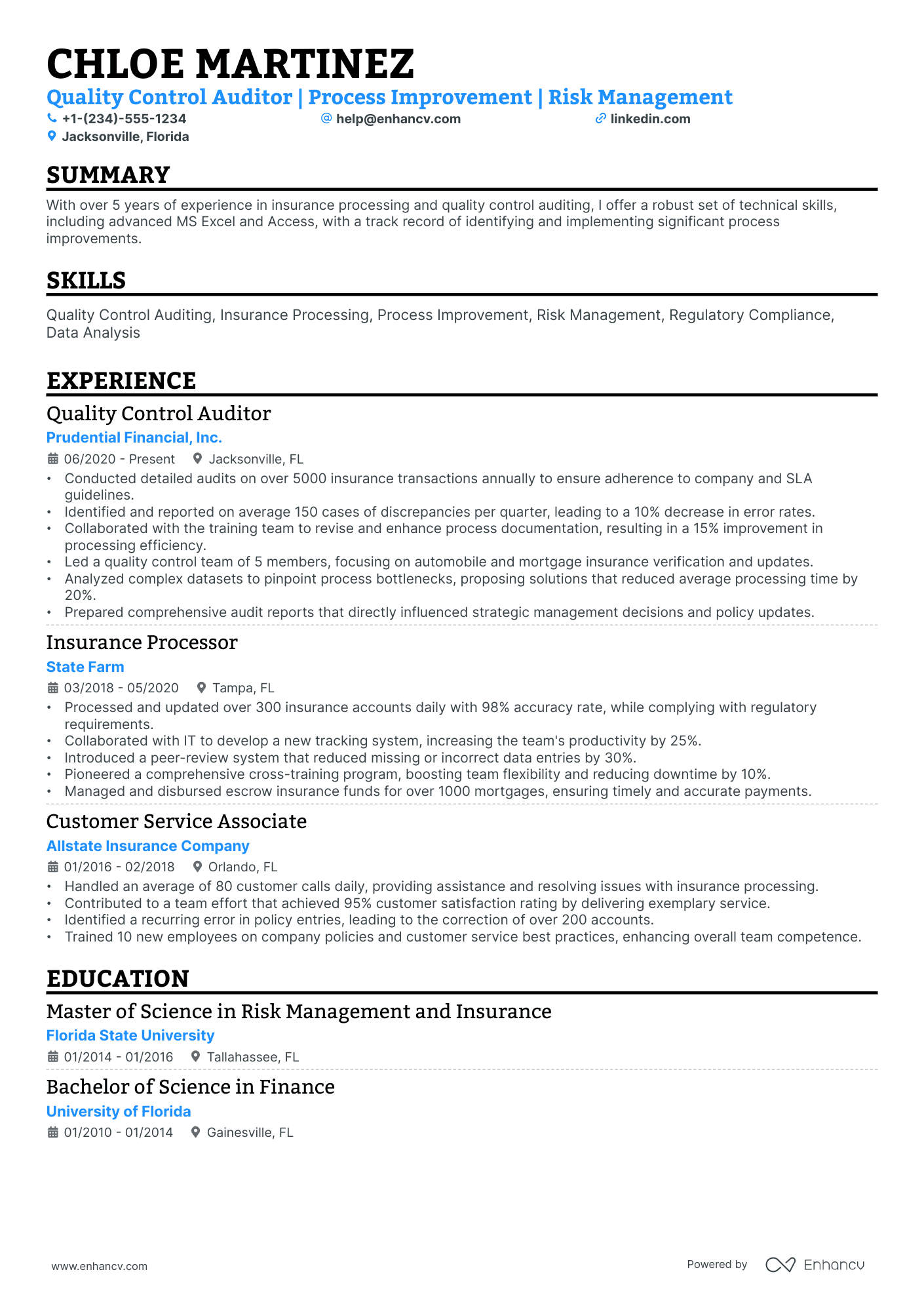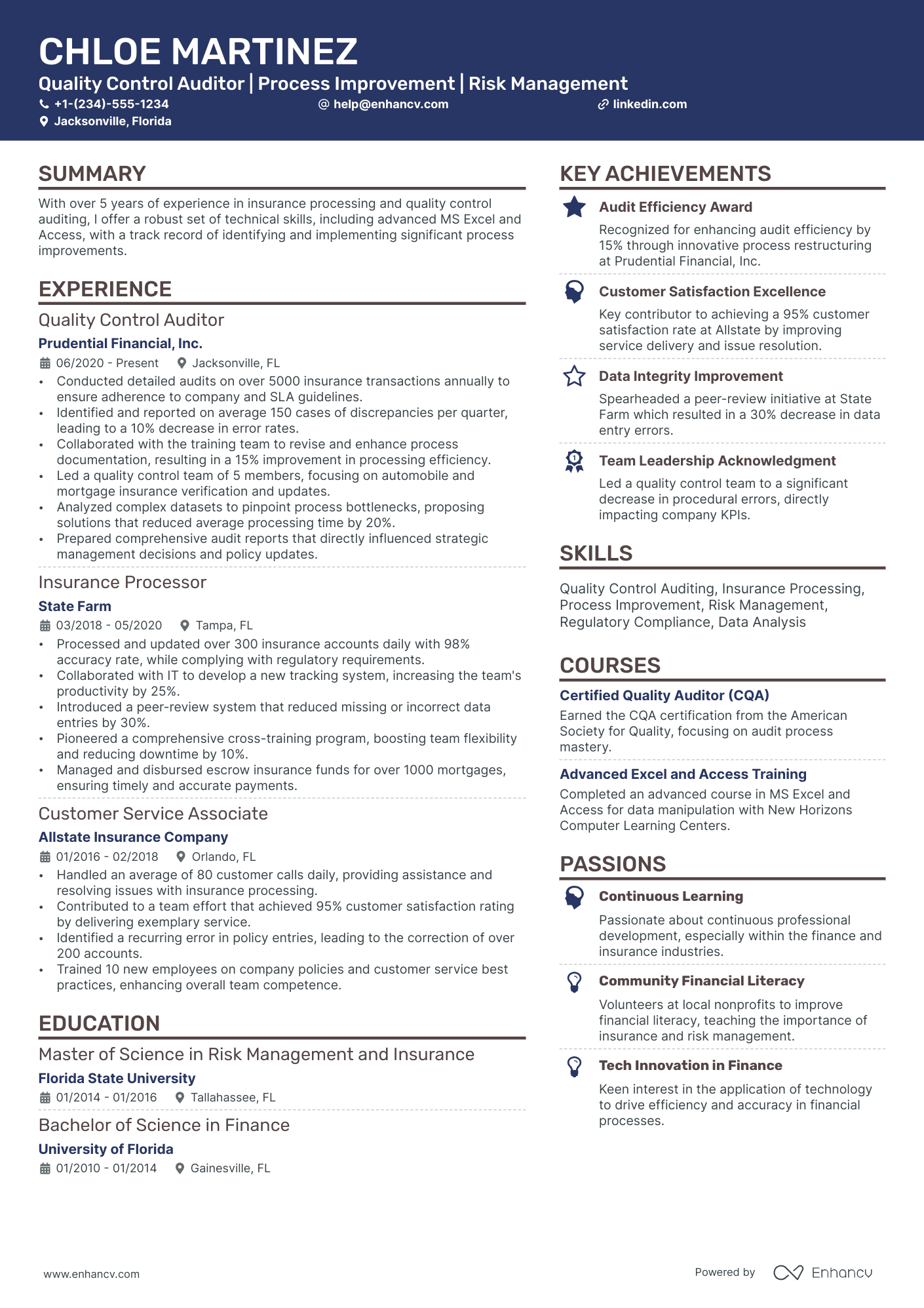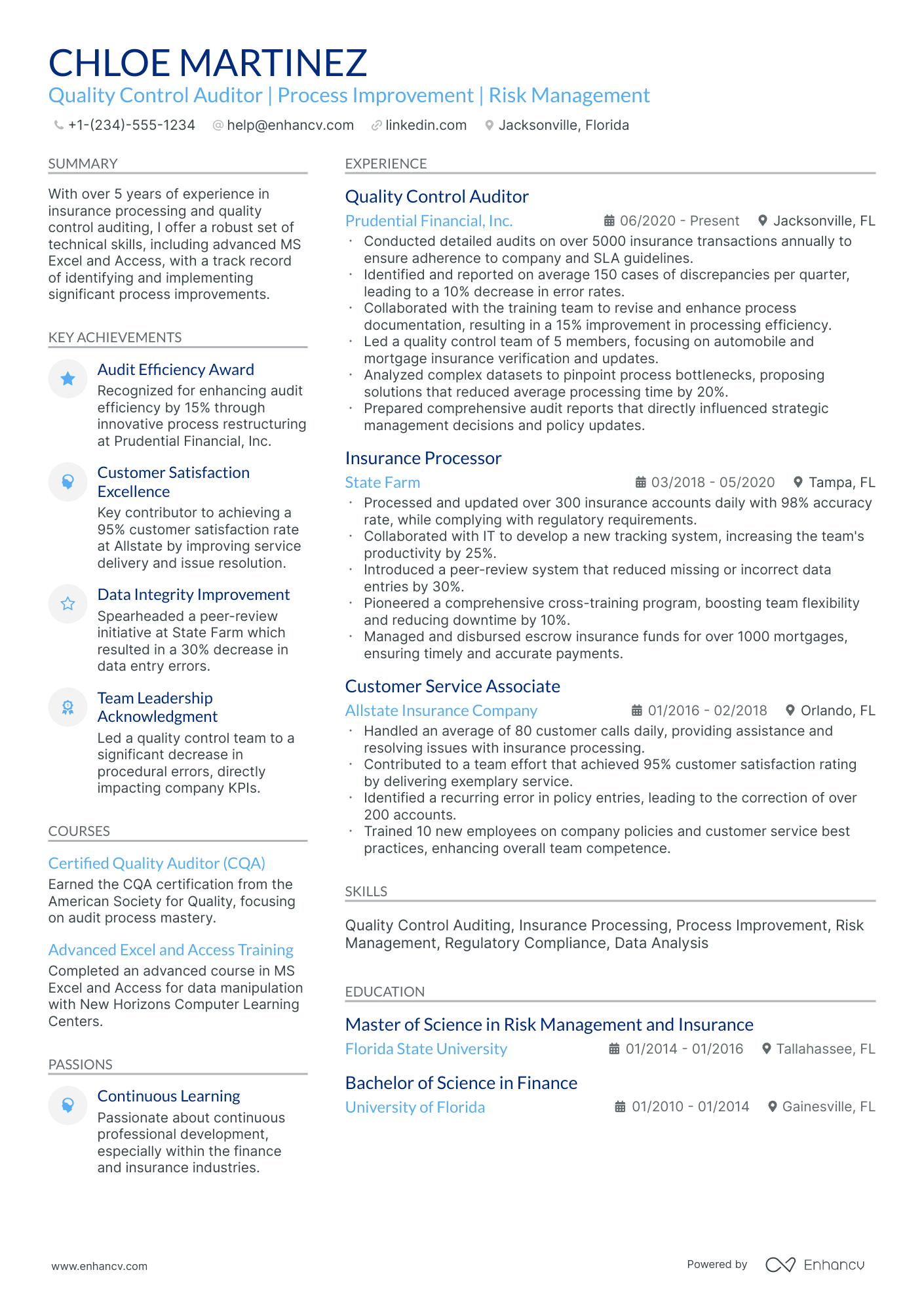As a quality control specialist, articulating the breadth and depth of your attention to detail on a resume can be particularly challenging. Our guide provides tailored strategies that help you succinctly highlight your precision-focused achievements, ensuring your resume stands out to potential employers.
- Quality control specialist resume samples that got people hired at top companies.
- How to perfect the look-and-feel of your resume layout.
- How to showcase your achievements and skills through various resume sections.
- How you could hint to recruiters why your resume is the ideal profile for the job.
If the quality control specialist resume isn't the right one for you, take a look at other related guides we have:
- Quality Supervisor Resume Example
- Supplier Quality Engineer Resume Example
- Quality Control Inspector Resume Example
- Quality Control Manager Resume Example
- Quality Technician Resume Example
- Quality Inspector Resume Example
- Quality Assurance Officer Resume Example
- Quality Assurance Associate Resume Example
- Quality Assurance Supervisor Resume Example
- Quality Auditor Resume Example
Simple guide to your quality control specialist resume format and layout
Successful quality control specialist resumes all have one specific characteristic - candidates have invested in a simple resume layout . One that is easy to read, makes a good first impression, and is adapted to their professional experience. There are three distinct resume formats to help you focus on your:
- professional experience - use the reverse-chronological resume format;
- skills and achievements - via the functional skill-based resume format;
- both experience and skills - with a hybrid resume format .
What is more, keep in mind that your resume may be initially assessed by the ATS (Applicant Tracker System) (or the software used by companies in the hiring process). The quality control specialist resumes that suit the ATS:
- have a header that includes either a role keyword or the job you're applying for;
- should be no longer than two pages;
- be submitted as PDF, unless specified otherwise.
Think about the market’s preferences – a Canadian resume, for instance, could have a different layout.
Upload & Check Your Resume
Drop your resume here or choose a file. PDF & DOCX only. Max 2MB file size.
PRO TIP
If you happen to have plenty of certificates, select the ones that are most applicable and sought-after across the industry. Organize them by relevance to the role you're applying for.
Don't forget to include these six sections on your quality control specialist resume:
- Header and summary for your contact details and to highlight your alignment with the quality control specialist job you're applying for
- Experience section to get into specific technologies you're apt at using and personal skills to deliver successful results
- Skills section to further highlight how your profile matches the job requirements
- Education section to provide your academic background
- Achievements to mention any career highlights that may be impressive, or that you might have missed so far in other resume sections
What recruiters want to see on your resume:
- Experience with quality control procedures and testing methodologies specific to the industry (e.g., ISO standards, Six Sigma, etc.)
- Proficiency in using quality control software and statistical analysis tools (e.g., Minitab, SPC software, etc.)
- Demonstrated ability to develop and implement quality control plans, checklists, and corrective action systems
- Skills in auditing processes, identifying non-conformances, and ensuring compliance with organizational and regulatory standards
- Strong analytical and problem-solving skills with the ability to lead root cause analysis and continuous improvement initiatives
Creating your quality control specialist resume experience to catch recruiters' attention
Remember that for the quality control specialist role, hiring managers are looking to see how your expertise aligns with their requirements. Here's where your resume experience section can help out. Make sure you:
- Include mainly roles that are relevant to the quality control specialist job you're applying for;
- Don't go too far back in your experience - recruiters will only care what you did a decade ago if it's really important for the quality control specialist role;
- Each bullet you include should say what you did, followed by the skills you used and the actual end result of your efforts;
- Quantify each of your achievements with numbers and possibly the overall effect it had on the organization;
- Highlight transferrable skills - or personal skills you've attained thanks to past jobs - that could be applicable within your potential workplace. This would showcase your unique value as a professional.
Formatting the experience section of your resume doesn't have to be an over-the-top deep dive into your whole career. Follow the quality control specialist resume examples below to see how industry-leading professionals are presenting their experience:
- Led quality assurance initiatives for a new product line, enhancing defect detection by 30% and reducing time-to-market by 2 months.
- Developed and implemented a rigorous quality control system for raw materials sourcing, improving supplier compliance by 45%.
- Collaborated with cross-functional teams to streamline the production process, thereby increasing overall plant efficiency by 20%.
- Conducted detailed statistical analysis to identify underlying production issues, leading to a 25% improvement in product consistency.
- Oversaw the implementation of ISO 9001:2015 standards across the facility, which elevated our market competitiveness.
- Mentored and trained a team of 5 quality technicians, enhancing team productivity and knowledge sharing.
- Executed over 200 quality control testing procedures per quarter, ensuring 99.8% compliance with industry regulations.
- Managed a pivotal quality control project for a high-profile client, resulting in a multi-year contract renewal worth over $2M.
- Harmonized testing methodologies across departments by introducing automation tools, cutting down error rates by 15%.
- Executed root cause analyses for recurring quality issues, establishing preventative measures that cut defects by 40%.
- Authored quality control documentation and protocols that became departmental standards referenced by over 100 employees.
- Pioneered a lean manufacturing initiative which reduced waste by 22% and benefited from a $50,000 annual cost saving.
- Enhanced supplier quality control scoring system, leading to more stringent vendor selection and improved product quality by 18%.
- Orchestrated a cross-departmental task force to address critical quality failures, which mitigated risk by 60% in subsequent production cycles.
- Drove continual improvement cycles based on key performance indicators, resulting in an average annual increase in customer satisfaction scores by 12%.
- Revamped the company's quality control protocol for a flagship product, boosting product reliability by 35%.
- Collaborated with international teams to ensure quality consistency across global markets, achieving a uniform quality standard deviation of 5%.
- Championed the adoption of automated inspection systems, cutting manual inspection hours by 50% while maintaining quality benchmarks.
- Developed a comprehensive Quality Management System, increasing process capability from 1.33 to 1.67 Cpk index on critical parameters.
- Facilitated the transition to a more sophisticated calibration management software, improving measurement accuracy by 10%.
- Instrumental in reducing product return rates by 5% year-over-year through meticulous quality auditing and feedback integration.
- Orchestrated the company-wide rollout of an electronic document management system, shortening document retrieval times by 70%.
- Led the quality aspect of a product redesign project, which saw a reduction in customer complaints by 50% within a year.
- Spearheaded a vendor re-qualification initiative that improved incoming material quality score by 20%.
- Forged a strong relationship with R&D to incorporate quality control considerations early in product development, shortening cycle times by 15%.
- Initiated a Six Sigma project aimed at manufacturing process improvements that saved the company $200,000 annually.
- Key member in a compliance task force that ensured zero non-conformities during an FDA audit, maintaining company's unblemished compliance record.
- Implemented digital record-keeping for all QC checks, enhancing traceability and reducing lost records by 100%.
- Crafted and executed a training program for new hires in QC practices, decreasing onboarding time by 30%.
- Played a critical role in a task force that reduced batch processing errors by 25%, significantly reducing product waste.
The following content includes information from "O*NET OnLine" by the U.S. Department of Labor, Employment and Training Administration (USDOL/ETA). Used under the CC BY 4.0 license. The data represents the top responsibilities present on the task lists for quality control specialist professionals.
Top Responsibilities for Quality Control Specialist:
- Test selected products at specified stages in the production process for performance characteristics or adherence to specifications.
- Compile and evaluate statistical data to determine and maintain quality and reliability of products.
- Study time, motion, methods, or speed involved in maintenance, production, or other operations to establish standard production rate or improve efficiency.
- Read worker logs, product processing sheets, or specification sheets to verify that records adhere to quality assurance specifications.
- Verify that equipment is being operated and maintained according to quality assurance standards by observing worker performance.
- Aid in planning work assignments in accordance with worker performance, machine capacity, production schedules, or anticipated delays.
- Evaluate industrial operations for compliance with permits or regulations related to the generation, storage, treatment, transportation, or disposal of hazardous materials or waste.
- Adhere to all applicable regulations, policies, and procedures for health, safety, and environmental compliance.
- Analyze, estimate, or report production costs.
- Assist engineers in developing, building, or testing prototypes or new products, processes, or procedures.
Quantifying impact on your resume
- Mention the number of quality audits completed accurately within given time frames to demonstrate meticulousness and efficiency.
- Include the percentage of defect reduction achieved from process improvements to show problem-solving capabilities.
- Specify the volume of products inspected to indicate experience with large-scale operations and attention to detail.
- List the amount of cost savings generated from quality control initiatives to highlight the impact on the company's bottom line.
- Describe the number of quality control training sessions led to emphasize leadership and knowledge-sharing abilities.
- State the reduction in customer complaints achieved through quality enhancements to showcase customer satisfaction focus.
- Quantify the number of successful projects led that resulted in certification or compliance with industry standards.
- Indicate the percentage increase in team productivity as a result of implementing new quality control procedures.
Action verbs for your quality control specialist resume
Making the most of your little to none professional experience
If you're hesitant to apply for your dream job due to limited professional experience, remember that recruiters also value the unique contributions you can offer.
Next time you doubt applying, consider this step-by-step approach for your resume's experience section:
- Rather than the standard reverse chronological order, opt for a functional-based format. This shifts the focus from your work history to your achievements and strengths;
- Include relevant internships, volunteer work, or other non-standard experiences in your quality control specialist resume's experience section;
- Utilize your education, qualifications, and certifications to bridge gaps in your quality control specialist resume experience;
- Emphasize your interpersonal skills and transferable skills from various industries. Often, recruiters seek a personality match, giving you an advantage over other candidates.
Recommended reads:
PRO TIP
List your educational qualifications and certifications in reverse chronological order.
Bringing your quality control specialist hard skills and soft skills to the forefront of recruiters' attention
Hard skills are used to define the technological (and software) capacities you have in the industry. Technical skills are easily defined via your certification and expertise.
Soft skills have more to do with your at-work personality and how you prosper within new environments. People skills can be obtained thanks to your whole life experience and are thus a bit more difficult to define.
Why do recruiters care about both types of skills?
Hard skills have more to do with job alignment and the time your new potential employers would have to invest in training you.
Soft skills hint at how well you'd adapt to your new environment, company culture, and task organization.
Fine-tune your resume to reflect on your skills capacities and talents:
- Avoid listing basic requirements (e.g. "Excel"), instead substitute with the specifics of the technology (e.g. "Excel Macros").
- Feature your workplace values and ethics as soft skills to hint at what matters most to you in a new environment.
- Build a separate skills section for your language capabilities, only if it makes sense to the role you're applying for.
- The best way to balance quality control specialist hard and soft skills is by building a strengths or achievements section, where you define your outcomes via both types of skills.
There are plenty of skills that could make the cut on your resume.
That's why we've compiled for you some of the most wanted skills by recruiters, so make sure to include the technologies and soft skills that make the most sense to you (and the company you're applying for):
Top skills for your quality control specialist resume:
Statistical Process Control (SPC)
Quality Management Systems (QMS)
ISO 9001 Standards
Root Cause Analysis (RCA)
Failure Mode and Effects Analysis (FMEA)
Quality Assurance Software (e.g., MasterControl, TrackWise)
Lean Six Sigma methodologies
Inspection and Testing Techniques
Data Analysis Tools (e.g., Excel, Minitab)
Documentation and Reporting
Attention to Detail
Analytical Thinking
Problem-Solving
Communication Skills
Team Collaboration
Time Management
Adaptability
Critical Thinking
Organizational Skills
Customer Focus
Next, you will find information on the top technologies for quality control specialist professonals from "O*NET OnLine" by the U.S. Department of Labor, Employment and Training Administration (USDOL/ETA). Used under the CC BY 4.0 license.
Top technologies for Quality Control Specialist’s resume:
- Bentley MicroStation
- Dassault Systemes SolidWorks
- Eko
- Supervisory control and data acquisition SCADA software
- VIA Information Tools MAN-IT
PRO TIP
The more trusted the organization you've attained your certificate (or degree) from, the more credible your skill set would be.
Listing your education and certifications on your quality control specialist resume
Don't underestimate the importance of your resume education section . As it may hint at various skills (and experience) that are relevant to the job. When writing your education section:
- Include only higher education degrees with information about the institution and start/end dates
- If you're in the process of obtaining your degree, include your expected graduation date
- Consider leaving off degrees that aren't relevant to the job or industry
- Write a description of your education if it presents you with an opportunity to further showcase your achievements in a more research-focused environment
When describing your certifications on your resume, always consider their relevancy to the role. Use the same format to describe them as you would for your education. If you're wondering what the best certificates out there are for quality control specialist roles, check out the list below.
The top 5 certifications for your quality control specialist resume:
- Certified Quality Improvement Associate (CQIA) - American Society for Quality (ASQ)
- Certified Quality Engineer (CQE) - American Society for Quality (ASQ)
- Certified Quality Auditor (CQA) - American Society for Quality (ASQ)
- Certified Six Sigma Green Belt (CSSGB) - American Society for Quality (ASQ)
- Certified Manager of Quality/Organizational Excellence (CMQ/OE) - American Society for Quality (ASQ)
The content below includes information from "O*NET OnLine" by the U.S. Department of Labor, Employment and Training Administration (USDOL/ETA). Used under the CC BY 4.0 license. The data represents the top associations for quality control specialist professionals.
Top US associations for a Quality Control Specialist professional
- Accreditation Board for Engineering and Technology
- American Society for Engineering Education
- American Society of Mechanical Engineers
- Institute for Supply Management
- Institute of Industrial and Systems Engineers
PRO TIP
If you happen to have plenty of certificates, select the ones that are most applicable and sought-after across the industry. Organize them by relevance to the role you're applying for.
Recommended reads:
Your quality control specialist resume top one third: choosing between a resume summary or an objective
The top third of your resume is crucial, as recruiters might focus only on this section rather than reading the entire document. Therefore, it's important to carefully decide whether to include a resume summary or an objective.
- The resume summary encapsulates your most significant experiences, key achievements, and skills in the field. Ideal for candidates with substantial relevant experience, the summary previews what recruiters will find in the rest of your resume.
- The resume objective outlines your professional aspirations. It describes your career goals for the coming years and how you envision your role evolving in the prospective company. The resume objective is suitable if you have less professional experience and wish to emphasize various soft skills such as motivation, vision, and planning.
Explore some of the best examples of resume summaries and objectives from real-life professional resumes in the industry.
Resume summaries for a quality control specialist job
- With over a decade of experience in pharmaceutical quality control, a master's in chemical engineering, and exceptional analytical skills, I have successfully implemented a zero-defect program that resulted in a 30% reduction in product recalls at a leading pharma company.
- Dedicated quality control professional with 8 years of experience in the food and beverage industry, skilled in HACCP implementation, and ISO 9001:2015 certification, who has significantly increased product compliance to 99.9% through vigilant process improvements.
- As a former manufacturing supervisor eager to transition into quality control, my extensive knowledge of production processes and commitment to excellence make me uniquely qualified to contribute to enhanced quality standards and operational efficiency in a new sector.
- Former aerospace engineer with 12 years of experience in systematic troubleshooting and failure analysis, seeking to leverage my problem-solving abilities and attention to detail to excel in the quality control industry, ensuring products meet stringent safety and quality standards.
- Wishing to embark on a career in quality control, my objective is to apply my Bachelor's in Microbiology and passion for precision to assist in upholding the highest quality standards, while gaining hands-on experience and contributing to continuous improvement projects.
- As a recent mechanical engineering graduate, I aim to leverage my theoretical knowledge and fervent attention to detail to contribute to the quality control sector, with the objective of mastering various quality management systems and becoming a key player in ensuring product excellence.
Optimize your resume summary and objective for ATS
Drop your resume here or choose a file.
PDF & DOCX only. Max 2MB file size.
Average salary info by state in the US for quality control specialist professionals
Local salary info for Quality Control Specialist.” Source: My Next Move, National Center for O*NET Development. Accessed 10/15/2024
| State | Average Salary (in USD) |
|---|---|
| US National Average | $62,610 |
| California (CA) | $73,420 |
| Texas (TX) | $60,030 |
| Florida (FL) | $61,600 |
| New York (NY) | $64,170 |
| Pennsylvania (PA) | $55,510 |
| Illinois (IL) | $68,560 |
| Ohio (OH) | $59,870 |
| Georgia (GA) | $61,060 |
| North Carolina (NC) | $62,050 |
| Michigan (MI) | $58,990 |
Other relevant sections for your quality control specialist resume
Apart from the standard quality control specialist resume sections listed in this guide, you have the opportunity to get creative with building your profile. Select additional resume sections that you deem align with the role, department, or company culture. Good choices for your quality control specialist resume include:
- Language skills - always ensure that you have qualified each language you speak according to relevant frameworks;
- Hobbies - you could share more about your favorite books, how you spend your time, etc. ;
- Volunteering - to highlight the causes you care about;
- Awards - for your most prominent quality control specialist professional accolades and achievements.
Make sure that these sections don't take too much away from your experience, but instead build up your quality control specialist professional profile.
Key takeaways
- Invest in a concise quality control specialist professional presentation with key resume sections (e.g. header, experience, summary) and a simple layout;
- Ensure that the details you decide to include in your resume are always relevant to the job, as you have limited space;
- Back up your achievements with the hard and soft skills they've helped you build;
- Your experience could help you either pinpoint your professional growth or focus on your niche expertise in the industry;
- Curate the most sought-after certifications across the industry for credibility and to prove your involvement in the field.
